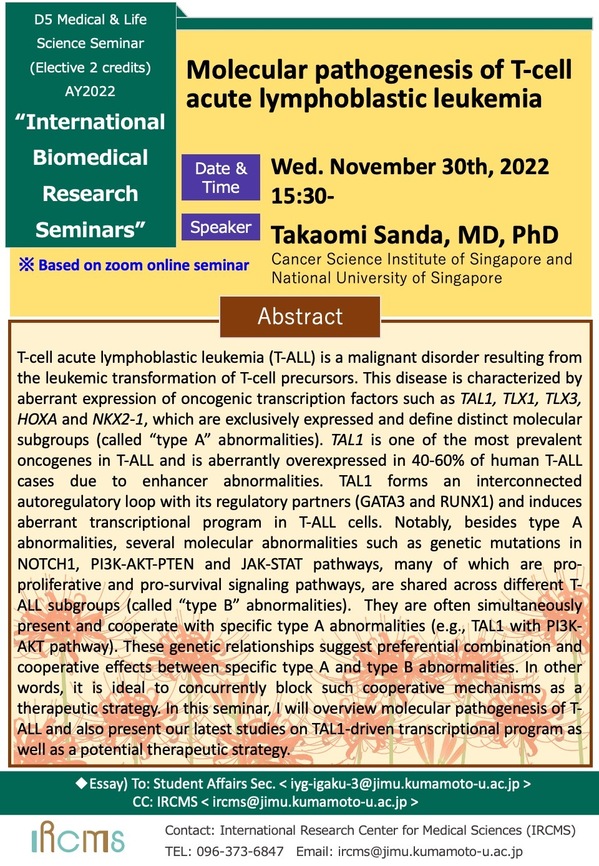- HOME
- News & Events
- [Nov. 30] D5 Medical & Life Science Seminar-Dr. Takaomi Sanda (Cancer Science Institute of Singapore...
News & Events
[Nov. 30] D5 Medical & Life Science Seminar-Dr. Takaomi Sanda (Cancer Science Institute of Singapore and National University of Sngapore)
November 1 2022
The "D5 Medical & Life Science Seminar" course will be offered by International Research Center for Medical Sciences (IRCMS). It will run from May 2022 to March 2023, with lectures given by scientists who are affiliated with IRCMS or in collaboration with researchers at IRCMS. The lectures will be given once a month, in English, and by leading scientists in the relevant research field. Students will be taught: 1) how normal physiological functions are maintained in the human body; 2) how these systems become abnormal under certain pathophysiologic conditions; 3) why stem cells are important in animal development and homeostasis; 4) how stem cell-based approaches can help us understand disease mechanisms and find potential cure for diseases related to stem cell malfunction (e.g., cancer, aging).
Anyone who wants to join is welcome.
For students who have registered for the course, please check your attendance in Moodle.
Date : November 30, 2022 (Wednesday)
Time : 15:30 -
* Zoom online seminar
Speaker : Dr. Takaomi Sanda, MD, PhD
Cancer Science Institute of Singapore and National University of Singapore
Title : Molecular pathogenesis of T-cell acute lymphoblastic leukemia
Abstract :
T-cell acute lymphoblastic leukemia (T-ALL) is a malignant disorder resulting from the leukemic transformation of T-cell precursors. This disease is characterized by aberrant expression of oncogenic transcription factors such as TAL1, TLX1, TLX3, HOXA and NKX2-1, which are exclusively expressed and define distinct molecular subgroups (called "type A" abnormalities). TAL1 is one of the most prevalent oncogenes in T-ALL and is aberrantly overexpressed in 40-60% of human T-ALL cases due to enhancer abnormalities. TAL1 forms an interconnected autoregulatory loop with its regulatory partners (GATA3 and RUNX1) and induces aberrant transcriptional program in T-ALL cells. Notably, besides type A abnormalities, several molecular abnormalities such as genetic mutations in NOTCH1, PI3K-AKT-PTEN and JAK-STAT pathways, many of which are pro-proliferative and pro-survival signaling pathways, are shared across different T-ALL subgroups (called "type B" abnormalities). They are often simultaneously present and cooperate with specific type A abnormalities (e.g., TAL1 with PI3K-AKT pathway). These genetic relationships suggest preferential combination and cooperative effects between specific type A and type B abnormalities. In other words, it is ideal to concurrently block such cooperative mechanisms as a therapeutic strategy. In this seminar, I will overview molecular pathogenesis of T-ALL and also present our latest studies on TAL1-driven transcriptional program as well as a potential therapeutic strategy.
Flyer: (Click to enlarge)

